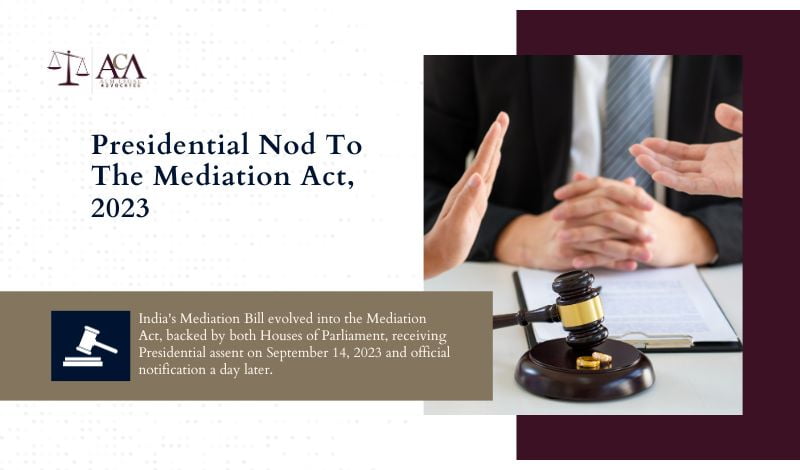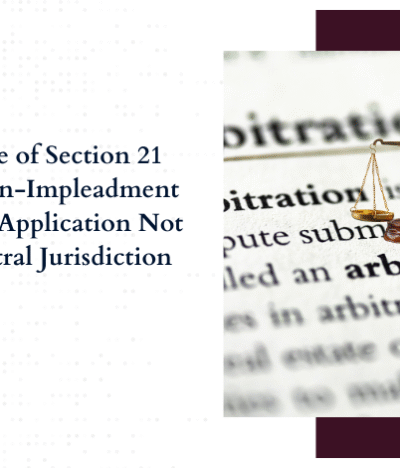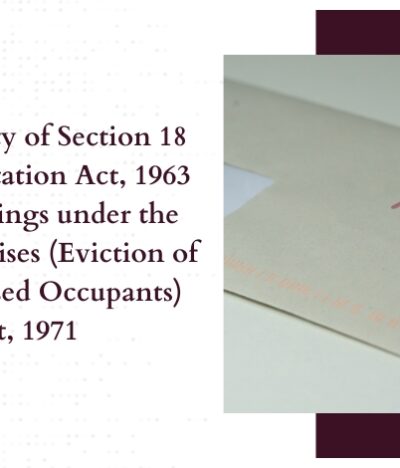The sphere of alternative dispute resolution in India received a monumental boost with the assent of the President of India to the Mediation Bill. The Mediation Act 2023 (“Act”), which was fervently awaited by the legal fraternity and the general public, aims to make mediation a cornerstone of India’s legal system. By emphasizing structured, institutional and online mediation, the Act is poised to usher in a new era of dispute resolution in India. This article provides an in-depth analysis of the Act’s origins, features, applicability and the challenges it aims to address.
Table of Contents
ToggleGenesis and Rationale Behind the Mediation Act, 2023
The journey of the Mediation Bill, 2023 from its inception to its transformation into the Mediation Act, 2023 is a testament to India’s commitment to strengthening its legal infrastructure with international practice. Both the Houses of Parliament, during the monsoon session gave their nod to the Bill. Following this, on September 14, 2023 the Bill received the Presidential assent and a day later the Ministry of Law and Justice officially notified it, bringing it into effect.
The primary objectives underpinning this legislation are multifold:
- Promotion of Institutional Mediation: To encourage disputing parties to resort to institutional mechanisms rather than ad-hoc mediation processes.
- Structured Enforcement Framework: To establish a robust mechanism that ensures mediated settlement agreements are not merely moral understandings but have legal enforceability.
- Online Mediation: Recognizing the digital age and the benefits of technology, the Act aims to make online mediation a mainstream, cost-effective, and efficient method for dispute resolution.
Broad Applicability Ensuring Widespread Reach
The Act boasts of a wide ambit ensuring its applicability in a myriad of scenarios:
- When mediation is carried out within the territorial bounds of India.
- Involving parties that predominantly operate, reside or have business interests in India.
- Where the mediation agreement expressly states adherence to this Act’s provisions.
- Cases of international mediation where at least one party is based in India.
- Disputes involving governmental bodies be it the Central Government, State Government or their associated entities, especially in commercial disagreements.
- Other disputes which are deemed appropriate for mediation under this Act.
The Act underscores the importance of written mediation agreements which can manifest in various forms – signed documents, communication exchanges or even pleadings where the existence of the mediation agreement is mutually recognized.
Mediators: The Lynchpins of the Mediation Process
A distinctive feature of the Mediation Act, 2023 is its inclusive stance on mediators. It permits individuals of any nationality to assume the role of a mediator. The parties involved in the dispute have the prerogative to select their mediator and determine the modalities of their appointment.
Once nominated, a mediator has a week-long window to express their acceptance. An integral part of the Act mandates mediators to disclose any potential or existing conflicts of interest transparently. Furthermore, to safeguard the sanctity of the mediation process, mediators are prohibited from serving as arbitrators, representatives or counsels in any proceedings related to the mediated dispute.
The Act also introduces a structured timeline for mediation. The process must culminate within 120 days from its commencement with a provision to extend it by another 60 days under exceptional circumstances.
Challenges and Constructive Criticisms
Like any pioneering legislation, the Act has had its fair share of critiques. One significant contention is the mandatory nature of participation in pre-litigation mediation. This seems to challenge the foundational voluntary essence of mediation.
The Mediation Council, which has the onus of regulating the profession has been under the scanner for its perceived lack of seasoned practitioners drawing parallels with other professional regulators like the Bar Council of India (BCI). Moreover, the Council’s reliance on the Central government’s nod for its regulations has raised concerns about potential conflicts of interest, especially when the government itself might be a party to certain mediations.
Another palpable gap in the Act is its limited purview concerning the enforcement of settlement agreements stemming from international mediations conducted outside India.
Conclusion
While the Mediation Act, 2023 is a monumental leap forward, it’s essential to address its criticisms for its holistic success. Balancing the scales between mandatory and voluntary mediation, ensuring the Mediation Council’s autonomy and expanding the Act’s scope to encompass international mediations are pivotal.
It’s equally imperative to recognize the Act’s myriad advantages. By facilitating a structured mediation process, the Act aims to reduce the burden on courts, expedite dispute resolution and ensure a cost-effective legal recourse for the masses.
In conclusion, the Mediation Act, 2023 fortified by the Presidential assent is a beacon of hope for India’s legal landscape. While it’s essential to address its shortcomings, one cannot overlook the revolutionary changes it promises. The Act not only symbolizes progress but also India’s unwavering commitment to adapting to the evolving demands of the legal world.





